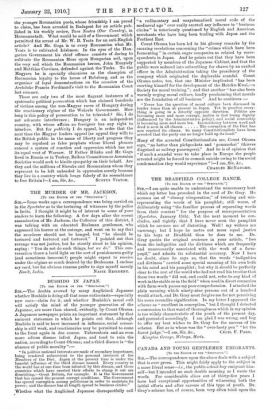POLITICAL PERSECUTION IN HUNGARY.
[TO THE EDITOR OP THE " SPECTATOR..1
SIR.,—Your readers will not have forgotten the cruel persecu- tion to which the Slovak patriot, Father Andrew Hlinka, has been subjected by the Hungarian Government since the summer of 1906, and which was largely responsible for the unhappy massacre of Csernova in OcIober, 1907. -Father Hlinka has now spent the best part of three years in prison; but his sentence expires at the end of this month, and as in the meantime he has been triumphantly acquitted by the Roman Curia of all the numerous charges trumped up against him by his Bishop (as the pliant instrument of the Govern- ment), he will soon be free to resume his duties as parish priest of Rdzsahegy. His great influence among the Slovak peasantry is distasteful to the Magyar authorities, and there. fore a fresh charge has been raked up against him by the Public Prosecutor. Over two years ago an article appeared in Slovensky Tysclennik under Father Hlinka's signature, without any proceedings being taken against its author within the period of time prescribed by law. After Hlinka was already in prison, a Slovak newspaper in America with which be had no relations, and over whose editor he, of course, had no control, reproduced Ibis article ; and it is on the ground of this American publication that the Public Prosecutor in Hungary is charging Father Hlinka with " incitement " against the Hungarian State ! The aim is to break Hlinka's spirit and to ruin his health, and thus to deprive the unhappy Slovak peasantry of one of its warmest defenders.
This evening (January 3rd) I have learnt with indignation that Mr. Octavian Goga, the most promising and popular of the younger Roumanian poets, whose friendship I am proud to claim, has been arrested in Budapest for an article pub- lished in his weekly review, Tara Nostra (Our Country), in Hermannstadt. What would be said of a Government which permitted the arrest of Mr. W. B. Yeats for an anti-English article F And Mr. Goga is to every Roumanian what Mr. Yeats is to cultivated Irishmen. In the eyes of the Hun- garian Government his chief offence consists of daring to cultivate the Roumanian Muse upon Hungarian soil, upon the very soil which the Roumanian heroes, John Hunyady and Matthias Corvinus, defended against the Turks. To the Magyars he is specially obnoxious as the champion of Roumanian loyalty to the house of Habsburg, and as the organiser of loyal demonstrations on the occasion of the Archduke Francis Ferdinand's visit to the .Roumanian Court last summer.
These are only two of the most flagrant instances of a systematic political persecution which has claimed hundreds of victims among the non-Magyar races of Hungary during the reactionary regime of the Wekerle Government. How long is this policy of persecution to be tolerated ? Sir, I do not advocate interference ; Hungary is an independent country, with whose affairs no foreigner has any right to interfere. But for publicity I do appeal, in order that the next time the Magyar leaders appeal (as appeal they will) to the British public in the name of liberty and progress they may be repulsed as false prophets whose liberal phrases conceal a system of reaction and oppression which has not its equal west of Warsaw. If Father Hlinka and Mr. Goga lived in Russia or in Turkey, Balkan Committees or Armenian Societies would seek to kindle sympathy on their behalf. Are they and the millions of Slovaks and Roumanians whom they represent to be left unheeded in oppression merely because they live in a country which brags falsely of its resemblance







































 Previous page
Previous page